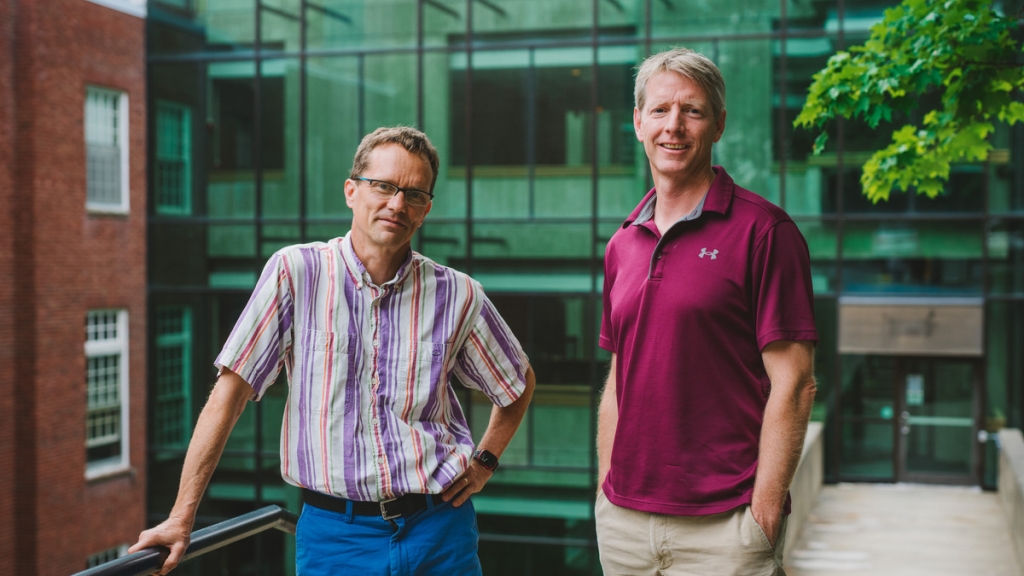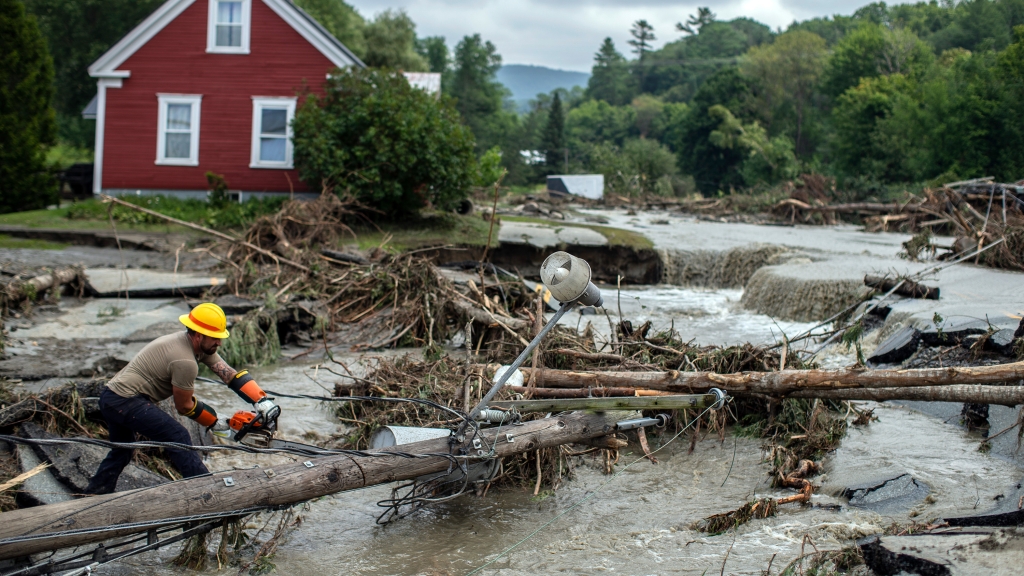The Climate Futures Initiative—a year-long effort aimed at exploring how Dartmouth can best use its institutional strengths to support research and experiential learning around climate change—has announced its first pilot project: an undergraduate course that will partner students with local community organizations to address real-world challenges in building climate resilience.
The two-term course, Community Partnerships for Climate Resilience, is being co-taught by Professor Carl Renshaw and Associate Professor Erich Osterberg, and will run in the winter and spring of 2025. Renshaw and Osterberg are both on the faculty of the Department of Earth Sciences.
CFI is a critical component of the Dartmouth Climate Collaborative, which is investing $500 million in climate-related capital improvements to reduce campus emissions 100% by 2050 and working to make the campus a living lab for new research, teaching, and collaboration.
"CFI was created to foster exactly this kind of innovative teaching, engagement, and leadership regarding the urgent issue of climate change," says Provost David Kotz '86.
"What's wonderful about this project is that it puts students in collaborative dialogue with people in our local community," says Professor of Anthropology Laura Ogden, director of CFI and special advisor to the provost on climate and sustainability. "It's both an opportunity for Dartmouth to be a good neighbor and for students to learn firsthand about what we need to do to respond to climate change."
Renshaw and Osterberg are in the process of recruiting potential community partners to work with students in the course. The professors hope to attract a diverse group of organizations representing a broad range of needs—for example, a local municipality that wants to work on flood risk mitigation, a snowmobile club seeking strategies to cope with decreasing and less-consistent seasonal snowfall, or a grassroots nonprofit or business where a small grant and a team of engaged students could make a big difference.
Ever since Tropical Storm Irene in 2011 caused widespread flooding in Vermont and the Connecticut River Valley, officials and residents in both Vermont and New Hampshire have been increasingly aware of impacts that research shows are fueled by climate change. Last week, for example, several towns in Vermont's Northeast Kingdom suffered major road damage after as much as 8.5 inches of rain fell in an extreme storm.
"Our focus is going to be working with folks who are most strongly impacted by climate change," says Osterberg, a climatologist who studies climate change in New England and the polar regions. "We have funds to implement these small projects, which is huge."
Renshaw, a hydrologist who studies the impact of flooding, says the idea for the course grew out of what he and Osterberg see as a critical need for more effective science communication, especially when it comes to climate change.
"Most people have a basic understanding of climate change and agree that global warming is happening, yet in the research community, we seem unable to persuade them to take action," Renshaw says. "At the same time, many students come to Dartmouth strongly interested in trying to do something about climate. We want to get students more attuned to how to work with community partners to achieve these goals. We're trying to expand beyond just the technical teaching to say, 'How can we best work with communities to effect positive change?' "
Osterberg and Renshaw are modeling their course on other project-based courses that incorporate community partnerships, particularly Dartmouth Engineering's Senior Design Challenge, a two-term capstone in which multidisciplinary teams of students collaborate with local businesses and organizations to solve real-world problems.
"The impact of experiences like these on students can't be overstated," says Associate Professor of Engineering Eugene Korsunskiy, who leads the Senior Design Challenge. "As they get out into the community to put their skills and knowledge to use on projects that make a real difference in the lives of individuals and organizations in the Upper Valley, our students begin to understand their power and potential to make meaningful positive change in the world. In experiences like these, their self-conception shifts from learner to maker, and that is an immensely important cognitive shift. I'm so glad that Dartmouth is supporting the creation of more courses like these, and I'm excited to see Erich and Carl's new course take off."
"What's core to this vision is getting students out of the Dartmouth bubble and into the community, starting by listening, putting aside preconceived notions about what the partner needs, and working collaboratively with the partner to come up with solutions and implement them," Osterberg says.

Earth sciences professors Carl Renshaw, left, and Erich Osterberg are co-teaching the Community Partnerships for Climate Resilience class. (Photo By Robert Gill)
The course is designed for seniors of all majors. Osterberg and Renshaw envision that it may one day be the capstone to a potential new minor in climate leadership—an idea that is part of an ongoing conversation about climate curriculum across Dartmouth that CFI is helping to facilitate.
"If you look across campus, there's strong faculty interest and many courses related to climate, but from a student perspective, it's difficult to create a cohesive program around it," Renshaw says. "We hope this course adds to the momentum that CFI is building to coordinate all the great climate teaching and research happening on campus."
"My hope for this course, and for CFI more broadly, is that every student leaves Dartmouth recognizing that climate change is an uneven process that affects communities and ecosystems in very different ways," says Ogden. "We need students to not only understand how climate change is transforming worlds, but also to have the tools to adapt and be resilient and be citizens of that future."
In addition to Renshaw and Osterberg's course, CFI will be launching other pilot projects—both curricular and research-based—in the coming academic year, Ogden says.
About the Climate Futures Initiative
Ogden describes CFI as "a faculty-driven planning process designed to help us understand what Dartmouth is already doing well on climate scholarship and sustainability and to make recommendations on where we should be going."
The initiative has been hosting a series of faculty colloquia, including sessions on Dartmouth's decarbonization initiative, the Organic Farm, and Arctic and cold regions, where Dartmouth has long been a leader in scholarship and policy. Fall sessions are planned on topics including forest lands, climate scholarship across campus, and climate in the curriculum.
Ogden—who with Dartmouth Sustainability Director Rosi Kerr '97 is also co-chair of the Dartmouth Climate Collaborative Advisory Council—is holding listening sessions with faculty at Thayer, Tuck School of Business, Geisel School of Medicine, and Arts and Sciences faculty working in the environmental humanities, and conducting dozens of informal conversations across campus.
"I've already talked to 100 faculty, and by the end of the fall, I hope to have reached more than half of the faculty in all schools," Ogden says. "By the end of it, we'll have had an enormous amount of faculty involvement in saying, 'This is where Dartmouth should sit in terms of climate scholarship. This is how we are unique and what we do well, and how we should tell that story to the world.' "
These conversations are painting a picture of a Dartmouth faculty already "talking about and teaching about climate change in every department in Arts and Sciences as well as at Geisel, Thayer, Tuck, and Irving," she says.
Among the common themes that are emerging include ideas for how to best use the campus and Dartmouth's rural New England environment as a laboratory for teaching and research on climate, as well as a continuing commitment to supporting Native American students and communities.
"I've never seen an issue that is so unifying at Dartmouth," says Renshaw. "You have a coalescence of support from the administration, the faculty, and the students all in agreement that we need to be leaders in this space."
Osterberg agrees. "It's an exciting time to be working on climate at Dartmouth," he says.
